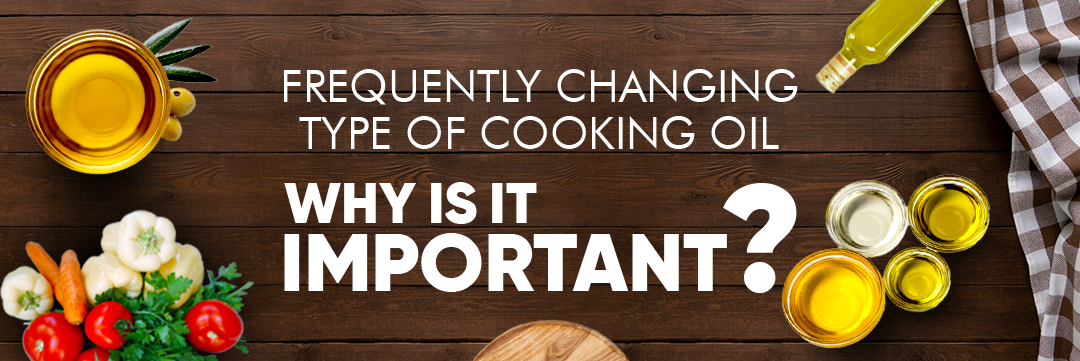Health experts and nutritionist advice that the type of cooking oils must be changed frequently, even every month.
Why is it important to change the type of cooking oil frequently? Are there any health benefits of changing types of cooking oils used? If yes, then what? These are the questions that most people ask nutritionists and health experts frequently.
To answer these queries let us first understand some facts about fats and oils.
Oils and fats are an indispensable part of every kitchen. They provide the desirable physical, nutritional, organoleptic properties to the food. Oils are mainly used as a cooking medium in different food preparations.
Apart from the properties mentioned above, oils and fat also play an essential role in the health of humans. Fats not only provide essential fatty acids but are also required for the absorption of fat soluble vitamins, that is vitamins A, D, E and K. Fats and oils are essential for the proper growth and development, especially during infancy and childhood and provide, are crucial for proper brain and nerve function throughout life and they are also required for the synthesis of important enzymes (bile) and hormones (estrogen, progesterone and testosterone) in the body.
The dietary guidelines for Indians, by the experts of Indian Council of Medical Research and National Institute of Nutrition (ICMR-NIN expert committee), have suggested that 25-30% of the total day’s calories should come from fats. However, it is important to manage the type of oils consumed. Out of this 30%- 7-10% should be from saturated fats, and rest 15-20% from unsaturated fats (both poly- and mono-unsaturated)
To understand this concept about the type of oils, we need to understand the various types of fats. * Fats are made up of fatty acids, which are mainly of three types. These 3 main types of naturally occurring fatty acids are –
- saturated fatty acids (SFAs): fats that contain SFA are coconut oil, butter, cream and other animal fats, these are generally solid at room temperature
- monounsaturated fatty acids (MUFAs): fats that contain MUFA are mustard, olive oil, palm oil and groundnut, these are normally liquids at room temperature.
- polyunsaturated fatty acids (PUFAs) such as omega-3 and omega-6 fatty acids: fats that contain PUFA are rice bran oil, sunflower oil, soybean oil, safflower oil, etc. these are liquid at room temperature.
Apart from this there is another type of fatty acid which occurs only in very small quantities naturally, but are produced in greater amounts during processing of food, during hydrogenation of fats and also during repeated heating of cooking oils are trans fatty acids.
In addition, fats and oils contain several antioxidants, like tocopherols, oryzanol, carotenes, tocotrienols, etc., certain phytosterols, like brassicasterol, sistosterol, etc., some fat soluble vitamins such as vitamin E and β-carotene and micronutrients such as calcium, phosphorus, copper, manganese and magnesium. These are found in good amounts in cold pressed compared with refined oils as they are destroyed during the process of refining.
(for details on benefits of cold pressed oils read the write up on “ARE COLD PRESSED OILS REALLY BETTER THAN REFINED OILS” @ https://multano.in/blogs/news/are-cold-pressed-oils-really-better-than-refined-oils)

It is important to note here that all these fatty acids are important for good health and play important roles in human health. It is important to regulate the quantity and proportion of each type of fatty acid in diet. The most harmful, however, are the trans fatty acids.
Coronary heart disease (CHD) is one of the leading causes of death all over the world, especially in developing countries such as India. There are many causes of CHD which include, increase blood pressure or hypertension and raised blood lipid levels. Studies have shown that increased consumption of SFAs, inappropriate proportions of MUFA and PUFA along with incorrect ratios of omega -3 to omega-6 in diet were responsible for these health issues leading to CHD. Apart from CHD, these improper proportions can also lead to many other chronic diseases such as obesity, diabetes, depression, inflammation and even Alzheimer’s.
Now let us understand “Why do oils need to be changed frequently for good health?”
All oils contain some amounts of SFAs, MUFAs and PUFAs. However, all oils have a different fatty acid composition, some are rich in MUFA, some in PUFA while some contain more of SFAs. For example, coconut oil has approximately. 90% SFAs, 8% MUFAs and only 2% PUFA whereas sunflower oil contains approximately, only 11% SFAs, 36% MUFAs and 53% PUFAs. Some oils are good sources of omega 3 fatty acids while others contain good amounts of omega-6 fatty acids.
Whereas MUFA are good for improving insulin levels and keeping blood sugar levels under control, PUFA are anti-inflammatory and reduce the risk of heart disease. MUFAs also help in lowering bad cholesterol and improving good cholesterol levels, whereas PUFAs help in promoting mood and alleviating depression and anxiety. SFAs on the other hand are important for the proper brain and nerve development of the fetus and during infancy, proper brain and nerve function throughout life and for formation of certain enzymes such as bile.
This means a balance of all these types of fats is important in proportions as suggested by the ICMR-NIN expert committee. In order to maintain this balance and to get maximum health benefits, it is recommended that the oils must be changed at regular intervals. It is best to use several oils for best health benefits.
So, how to change oils?
Since the properties of each oil are different, each oil has its unique uses in cooking. Certain oils are better for pan-frying or shallow frying such as canola oil, vegetable oil or coconut oil; others are better used for mayonnaise, salad dressings, in sauces, etc. such as olive oil, while still others are good to use for deep-frying, baking and cooking at high temperatures, such as mustard oil and coconut oil. Every oil has a different taste, use and health benefit. Choose the oil best suited for the purpose it is intended for.
It is best to use cold pressed, non-refined oils for maximum health benefits. In Indian cooking methods, oils are subjected to high temperatures. These high temperatures not only destroy antioxidants like vitamin E and β-carotene but also produce toxic compounds that may potentially be mutagenic (cancer producing) and atherogenic (promoting fatty deposits in arteries) . It is advisable to avoid refined oils, since during the refining process, oils are heated to high temperatures resulting in their degradation and generation of toxic substances. Refined oils, particularly high in PUFAs, degrade easily and therefore, should be avoided for frying.
Further, appropriate blending of edible oils (such as rice bran and safflower oil; coconut and sesame oil; canola and flaxseed oil) also appears to be a good option to reduce the plasma lipid levels and inflammation and, thus, the CHD risk.

NOTE: *Oils are a type of fats that are liquid at room temperature.
Ms Sunita Roy Chowdhury, Senior Nutritionist, Dietician and Nutrition Educator
Healthynudgez and Guiding Stars Open Learning Academy,
Under the banner of SS Guiding Stars Pvt. Ltd.
Disclaimer
At Multano we are passionate about helping people make their lives healthier and happier. All information provided in this article is researched and authenticated by qualified experts. We are dedicated to providing reliable and accurate information to our readers. However, please use the information provided here with discretion. Any changes in medication/diet must be done with the approval of your treating medical practitioner/Dietician only.


